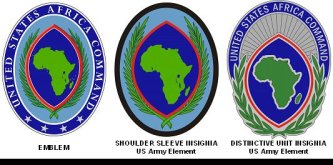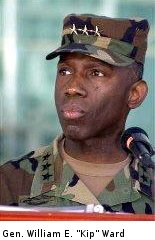AFRICOM: America's Military Foot in Africa's Doorway
Bruce Dixon | 14.10.2008 16:59 | Anti-militarism | Anti-racism | Globalisation | World
Commanded by a Black American general and incorporating State Department and
other civilian personnel from top to bottom it is billed as a "new kind" of
US military command.
Incorporating nearly all US civilian programs in Africa under its umbrella,
from trade to aid to public information, AFRICOM marks the militarization of
US policy toward what is already the most war-torn region in the world.
AFRICOM's planners offer their twelve year intervention in Somalia, where a
million out of ten million have died due to US intervention, as a "model"
for the continent.


Since the end of the second world war, the US has been the dominant foreign
power in Africa. Between 1950 and 1989, Africa was the target of more than a
billion and a half dollars in US military aid [1]. The Clinton
administration ramped the militarization of Africa to unprecedented levels,
funneling enormous quantities of arms, training and other military
assistance to 50 out of the 53 nations in Africa. The Bush regime has
further escalated the quantities of arms and aid and on October 3, 2008
inaugurated Africom [2], the Pentagon's eyes, ears, mouth, wallet and foot
on the African continent.
As Asad Ismi and Kristin Schwartz in the Ravaging of Africa [3] told us last
year:
"Africa is the most war-torn region in the world, with armed conflicts going
on in nine countries; Ethiopia with Somalia, civil war in Ethiopia, Uganda,
Chad, Nigeria, Morocco with Western Sahara, and Algeria. The US has provided
arms and military training to participants in all of these nine wars.
Washington has done the same in another five wars that ended during
2002-2006. These are the long civil wars in Angola, Sierra Leone, Burundi
and Liberia, as well as that in Congo-Brazzaville.
[image002.jpg]
Thanks to half a century of pouring US arms stockpiles into Africa, the
price of an assault rifle in Africa has for some time been cheaper than
anyplace [4] else on the planet. US military assistance programs, American
arms, American corporations and America's insistence upon privatization of
military functions are everywhere to be found in Africa. At the end of
August, Africom's commander, General William E. "Kip" Ward was keynote
speaker of the graduation exercises of Liberia's military training facility
[5], which is jointly run by Lockheed-Martin subsidiary Pacific Engineering
& Architecture [6] , and DynCorp [7], which supplies mercenaries and
torturers in Iraq, Afghanistan, Bosnia, Congo, Colombia, Darfur, and
elsewhere. Africom then, seems to follow the traditional American practice
of requiring that as much of America's military and non-military "aid" as
possible is spent with politically influential US corporations.
Aficom is unlike other US military commands around the world in that its
command structure includes both civilian and military officials from the top
to the bottom, and in that Africom will openly and directly administer all
civilian programs funded through the US Dept. of State. Africom's deputy
commander is Ambassador Mary C. Yates, and Africom will be in charge of all
State Department, USAID and a number of other US government civilian
programs in Africa, reflecting a militarization of US Africa policy from top
to bottom.
In an essay titled "What is Africom Really About? [8] "earlier this year,
Daniel Volman reported attending a conference of US and African government
officials at the National Defense University [9] aimed at getting Africom up
and running.
"The conference was very much a nuts-and-bolts discussion of all the
practical matters of making Africom work.
"The first interesting thing was the discussion of how they define Africom's
mission. The presentation on this were based on internal DoD presentations,
so they were much more honest and revealing than the kind of thing that
comes from the public pronouncements. The presentation specifically cited
the challenge of preventing disruptions in African oil production and
exports as one of Africom's six chief missions, along with meeting the
challenge of China, controlling ungoverned regions and transnational
extremism, dealing with instability in the Horn of Africa, dealing with
instability in the Great Lakes region, and dealing with the situation in
Chad/Sudan.
"A couple of other interesting points they made was to say that they saw the
Joint Task Force-Horn of Africa (the people who are spearheading U.S.
involvement in Somalia and Ethiopia) as a model for what Africom could do in
the rest of the continent. They admitted that they had made no attempt to
consult with anyone at the UN while they were developing Africom and hadn't
really consulted with anyone in Africa either.
"It was clear from their statements that they were very surprised and
unhappy about the public response from Africans to Africom and that this was
the reason that they were going to have to keep the Africom HQ in Stuttgart
for the time being, although they will continue to look for African hosts
and will also work on ways to station Africom staff people in less obvious
and provocative ways like sending small groups to liaison with selected
African military forces. They want to believe that this is just a problem of
public relations and that they just have to do a better job of explaining
themselves. One of the new buzzwords in Africom is 'active listening,' i.e.
pretending to care what other people think."
The fact that Africom's planners would cite Somalia as a model they'd like
to extend to the rest of the continent is more than a little instructive. US
involvement in that unhappy country since the 1991 overthrow of Siad Barre
has resulted in constant civil war and man-made famines, topped off by a US
funded invasion by Ethiopia that have killed a million people, about a tenth
of Somalia's population, and driven another million from their homes.
Coincidentally, Somalia is just across the Gulf of Aden from Arabia and the
Gulf States, and sits atop a virtually untapped lake of oil.
Evidently, keeping Africa barefoot, hungry, sick and at war with itself [10]
is good for American business. During the bloody Congolese war, in which the
US supported armies of nine nations invaded and pillaged the Congo killing
at least five million of its inhabitants, US policy was focused on keeping
the timber, gold, titanium, and other strategic minerals flowing to the US
and its allies, regardless of the civilian death toll. At the same time, a
conflict in Darfur, with somewhere between one twentieth and one fiftieth of
the Congo's death toll has rallied the bipartisan US foreign policy
establishment to call for open US military involvement in Darfur, perhaps
because some of Sudan's oil is going to China.
Africans are not fools, and despite the clamor of a few of the continent's
most discredited and craven regimes to locate Africom in their countries,
probably as the ultimate insurance against coups and revolutions, Africom
has not yet found an African host country. Most African governments fear
being labeled as abject stooges of Africom. They fear the wrath of their own
people, which is as it should be.
The questions for Americans concerned about the nation's policies in Africa
are stark. The militarization of Africa, and of US policy toward Africa is a
matter of bipartisan consensus, no matter who will be president come next
January. Africans can be expected to resist the extension of the Somalia
"model" to the rest of the continent. By now, this is business as usual. The
only question is whether activists on this side of the water are prepared to
somehow raise the cost of "business as usual" beyond what America's
otherwise unaccountable rulers are willing to pay.
Bruce Dixon is based in Atlanta, and can be reached at bruce.dixon(at)
blackagendareport.com
----
End notes:
[1]
 http://www.grandslacs.net/doc/2290.pdf
http://www.grandslacs.net/doc/2290.pdf [2]
 http://www.africom.mil/
http://www.africom.mil/ [3]
 http://www.blackagendareport.com/index.php?option=com_content&task=view&id=477&Itemid=1
http://www.blackagendareport.com/index.php?option=com_content&task=view&id=477&Itemid=1 [4]
 http://www-wds.worldbank.org/external/default/WDSContentServer/IW3P/IB/2007/04/13/000016406_20070413145045/Rendered/PDF/wps4202.pdf
http://www-wds.worldbank.org/external/default/WDSContentServer/IW3P/IB/2007/04/13/000016406_20070413145045/Rendered/PDF/wps4202.pdf [5]
 http://allafrica.com/stories/200808290198.html
http://allafrica.com/stories/200808290198.html [6]
 http://www.sourcewatch.org/index.php?title=Pacific_Architects_and_Engineers,_Inc.
http://www.sourcewatch.org/index.php?title=Pacific_Architects_and_Engineers,_Inc. [7]
 http://www.corpwatch.org/article.php?list=type&type=18
http://www.corpwatch.org/article.php?list=type&type=18 [8]
 http://allafrica.com/stories/200803280720.html
http://allafrica.com/stories/200803280720.html [9]
 http://www.ndu.edu/
http://www.ndu.edu/ [10]
 http://www.blackcommentator.com/50/50_cover_africa.html
http://www.blackcommentator.com/50/50_cover_africa.html
Bruce Dixon
 e-mail:
bruce.dixon(at)blackagendareport.com
e-mail:
bruce.dixon(at)blackagendareport.com
 Homepage:
http://www.blackagendareport.com/index.php?option=com_content&task=view&id=8
Homepage:
http://www.blackagendareport.com/index.php?option=com_content&task=view&id=8